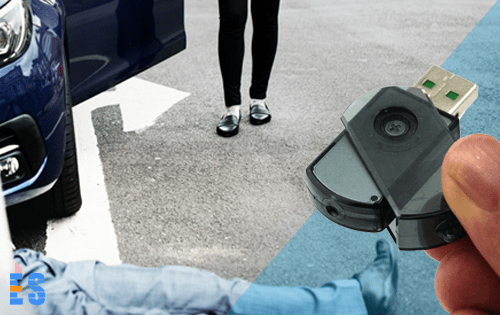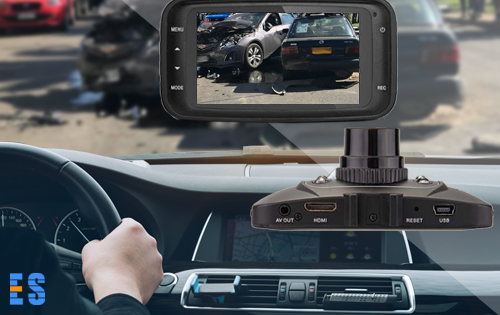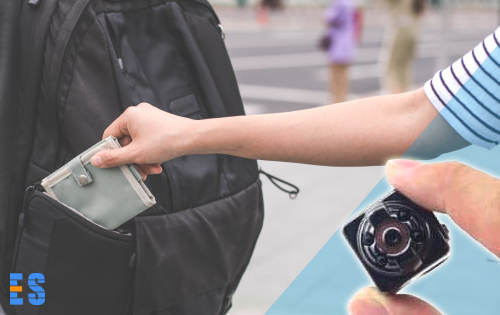Today we all carry a smartphone in our pocket and one of the peculiarities of these devices is that they allow us to take photos and record videos at any time. But, can you film on the street? Is it legal? Is recording an image the same as recording a conversation?
Nowadays we are not surprised to see someone recording anything on the street with their phone: a fire, someone who has fallen, a pickpocket while committing his crimes, a street performance, a showcase?

These behaviors are so common that we assume them to be totally normal and legal. However, we must be careful, recording images on a public road and sharing them later on our social networks is not as legal as we think and it can end up getting us into trouble.
Recording a person's image or even capturing their voice constitutes personal data and, as such, is protected. Hence the need to be cautious.
Although we are going to look at this issue in much more detail below, we can affirm that, a priori, we can record on public roads. What happens is that we must always do it with caution to not affect the rights of third parties. The right to privacy must be especially protected.
Warnings for filming on the street
It is important to distinguish between installed cameras and portable cameras. In the case of cameras installed on public roads their use is only allowed if the installation has been carried out by a Public Administration and it is the State Security Forces and Corps that are They are in charge of controlling the images.
In all other cases, recording public roads with a camera installed is not legal. This is something that both neighborhood communities and commercial premises should take into account, since many of them have security cameras that record part of the public thoroughfare. If someone denounces the situation, the camera should be removed. That, without counting the possible fine by the Spanish Agency for Data Protection.
If what is involved is making a recording on a public road with a mobile phone or other portable device, be careful not to capture the image of minors or images that may affect the honor or dignity of people. In addition, you cannot publicly disseminate the captured images, except in certain cases.
Cases in which it is possible to record in public and broadcast the image
They are those in which the right to information prevails over the rest, it only occurs in two cases:
- Picture of a public person in a public place.
- Existence of informative interest, being the accessory image.
Can I record on the street and upload it to the Internet? Does it have consequences?
If we strictly apply the law, it could be said that you can record on the street but not make a public broadcast of the captured image (upload it to Facebook, YouTube, etc. .) if we do not have the express consent of all persons appearing on the recording. Unless we are in one of the cases that we have just indicated in the previous section.
Now, if you are recording a video of your vacation in the middle of the street, you are not going to ask the consent of all the people who appear in the background.
In general, there is usually no problem with uploading these recordings, but if anyone in the video finds the same video and asks you to delete it, you will have to do so
Cases in which it is not possible to record on the street or disseminate the image
They arethe cases in which the right to privacy prevails over everything else:
- When the purpose is to reproduce the intimate life of a person.
- If you want to discover personal details.
- It is done for advertising or commercial purposes.
If the image has been captured for any of these purposes and you want to disseminate it, it is absolutely necessary to have the express consent of the people who appear in the recording.
Recording images without consent on the street with a car camera
The phenomenon of video cameras installed in vehicles is so new that there is still no specific regulation that regulates this issue. Not even the institutions seem to agree.
While in some cases it is understood that these types of recordings are useful as evidence if an accident occurs, in others it is understood that an individual cannot be making a continuous recording of public roads

In any case, the use of this type of cameras must always have a purpose related to security, so the captured images should be deleted immediately if nothing noteworthy has been recorded in them .
Can you record on the street with a video surveillance camera?
There are many people who, in order to improve their security, install surveillance cameras on the front of their houses to prevent theft or, at least, have images of the thieves.
Now, even if this camera is installed in a private area, you have to make sure that it never captures images of roads and public spaces.
Article 42 of the Private Security Law establishes that:
"Cameras or video cameras may not be used for private security purposes to take images and sounds of roads and public spaces or public access except in the cases and under the terms and conditions provided in its specific regulations, prior administrative authorization by the competent body in each case".
The Spanish Data Protection Agency (AEPD) itself has clarified in its Resolution R/00818/2012, of May 18, that:
"the processing of images in public places can only be carried out, unless there is governmental authorization, by the Security Forces and Bodies".
In other words, in no case can a private video surveillance camera installed in a home or business capture images of public roads.
Recording images without consent on the street with a car camera
Many users of cars, motorcycles and bicycles have decided to install a camera in your vehicle to have proofin case of an accident.
In these cases the recording could be used as evidence to report an infringement. It is understood that, a priori, it is a recording that is made for private purposes but that, by accident, ends up becoming a means of proof.
On what there is no agreement is whether or not it is legal to share the image of an offending driver on social networks pixelating all the data that may contribute to their identification (license plate , image, etc).
The AEPD has not ruled on this yet, butLogic advises not to share this type of image publicly. If an infraction has been recorded, it is normal to go with that video directly to the Police so that measures can be taken and the offender prosecuted. Posting the video on social networks in the end leads nowhere.
Cameras installed in private places that record public spaces
It may happen that a camera that is installed on private property complying with legal requirements, and in order to guarantee security, is also capturing images of a public road and such capture is unavoidable. This can happen, for example, if the hidden house surveillance camera is pointing at the entrance to a garage.
On this subject, Instruction 1/2006 indicates in its article 4.3 that
"cameras and camcorders installed in private spaces may not obtain images of public spaces unless it is essential for the intended surveillance purpose, or it is impossible to avoid it due to their location. In any case any data processing unnecessary for the purpose pursued must be avoided".

The Spanish Data Protection Agency (AEPD) has clarified concepts on this issue and has established that
"for the exception contained in article 4.3 of Instruction 1/2006 to be applicable, there must not be a possibility of alternative installation, without being able to interpret that said precept constitutes an authorization to capture images in public spaces, since that in no case can the use of surveillance practices be accepted beyond the environment object of the installation and in particular with regard to the surrounding public spaces, adjoining buildings and vehicles other than those that access the monitored space"</em >
In other words, a surveillance camera installed in a private space could record public spaces and this would not imply an intrusion into people's privacy, if There is no other possibility of alternative installation and the capture of images is limited to what is strictly necessary.
What happens if I capture images on public roads recording from cameras installed in private spaces?
No, not even using the best spy camera we can say that this exception applies to them. We may be using these types of cameras for a reason as legitimate as trying to discover who is doing graffiti on the facade of our business or who is the vandal who is dedicated to breaking the locks of cars parked on the street, but this does not justify the use of a spy camera.
There is no situation that enables us to use a spy camera on the street, since by doing so we are violating current legislation.
What if I record a confession of a crime?
Imagine you are recording an image or a conversation and you catch a confession to a crime, could you use it as evidence? We already anticipate that, as unfair as it may seem, this will depend on the situation.
For a confession to be used as evidence against an alleged criminal, it must be voluntary. That is to say, that whoever confesses does so freely and with the full intention of letting the whole world know what he has done.
If you're filming a friend and he seizes the moment to confess that he's the one who stole your wallet, you can use that image as evidence.
Now you canIt may happen that the confession you have caught by chance. You are recording a video of your children playing in the park and by chance the voice of a person who is talking to another person and telling them that they have committed a crime slips through.
In this case we have a complex situation. There is someone who is voluntarily confessing to a crime, but who records the conversation was not the recipient of that information.
In general terms, recording someone else's conversation is a crime against privacy, but if you are recording in a public place it is logical that other people's conversations sneak in, even if your intention is not capture them.
Is there a violation of the right to privacy of the alleged offender in this case?
It will depend on the judge, but in most cases it is generally understood that this is not the case.
However, this does not mean that the recording will be accepted as evidence without further ado. In most cases, this type of accidentally recorded confession is not considered evidence as such, but a mere "notitia criminis". That is, information that will help in the investigation to discover the truth about the crime.
And we still have one last situation left, that in which someone deceives or provokes another person to record their confession. In these cases, that confession is never admitted as evidence in a trial.
What happens if I have recorded a minor?
If protecting the image of adults is important, protecting that of minors is even more so.
There are several options here. Either you completely refrain from sharing the image, or you ask for the consent of the parents (or the minor himself if he is over 14 years old) or you upload the image but pixelating the faces of the minors.</p >
Protection of privacy Vs right to information
The reason why the use of cameras in public spaces is so limited is because the recordings can directly affect people's privacy.
The right to privacy is recognized as a fundamental right in our Constitution. This implies that it enjoys special protection.
Images captured of a person, even if they are unaware of the recording, become personal data. These files are subject to data protection legislation, which in recent years has been perfected and hardened.
Those who appear in a recording must know the data about the file in which the images will be stored and the identity of the person responsible for it. And this in order to be able to exercise the rights of access, rectification and cancellation and opposition, which is known as ARCO rights.
What is clear is that if the camera is hidden and nobody knows that it is recording, it is impossible for those affected to exercise those rights, so a violation occurs both the privacy of individuals and the legislation on data protection, which provides for significant fines in these cases.
Privacy is such an important right that it is defended above others. There is only one exception, if it collides with the right to information.
We can record third parties on the street without the need for their consent as long as they are public figures who are in a place open to the public or if there is informational interest.
Burn images without permission or consent What happens?
Like recording a conversation without authorization, recording a person with a spy camera without permission may be illegal.
It's not just thatthat you can be sentenced to a prison sentence of up to four years for violation of article 197.1 of the Penal Code, which defines a crime against privacy. But also the Spanish Data Protection Agency could impose a fairly high fine on you.
For this reason, before using any recording or filming device, it is important that you inform yourself well about the use you can give it and what you cannot do with it or with the images or sounds captured . Remember that in certain cases a recording may become legal, but its public dissemination may constitute an infringement of the right to privacy of those affected.
Collision with right to privacy
The right to privacy is a fundamental right that everyone enjoys, which is why it has special protection.
It can be understood that if we record someone we are directly violating their privacy, which is why the Penal Code has criminalized this conduct. Its article 197.1 sanctions this conduct:
"Whoever, to discover the secrets or violate the privacy of another, without their consent, seizes their papers, letters, email messages or any other documents or personal effects, intercepts their telecommunications or uses technical artifices of listening, transmission, recording or reproduction of sound or image, or any other communication signal, will be punished with prison terms of one to four years and a fine of twelve to twenty-four months"
This implies that recording someone's image in public without their consent and also disseminating it later through social networks can become a criminal act if it is estimated that it directly affects the privacy of a person.
However, there are also exceptions by virtue of which anyone can record and disseminate images captured on public roads even without the consent of the affected party.
What can we do then if we need proof?
You may have thought about using such a camera to obtain evidence that a crime is being committed on your street. For example, that a neighbor uses the nearby park to sell drugs.
If you install that camera in the park or nearby, you will not only be capturing images of the alleged criminal, but also of all the people who pass by and of the minors who use the facilities. And it is clear that this is something especially serious that cannot be allowed.
In this case, the best thing you can do is leave the matter in the hands of the Police. Report what is happening and let them carry out the investigation.
Common sense is the best ally
When filming in the street and then sharing those images, we may have doubts about whether or not it is legal. In these cases, the best solution is to apply common sense.
Think about the real utility that the video may have and whether or not it may affect the privacy of those who appear in the recording. Above all, pay special attention that minors do not appear in the images.
Imagine that you have been recorded in the same situation, would you like to see it published by a third person? If the answer is no, don't do it either.
When in doubt, it is always better to exercise caution and not publish the images. This decision can save you a lot of legal problems.
If what you have recorded is a crime or an administrative infraction, do not hesitate to inform the authorities of the authority.






 WhatsApp
WhatsApp Telegram
Telegram


